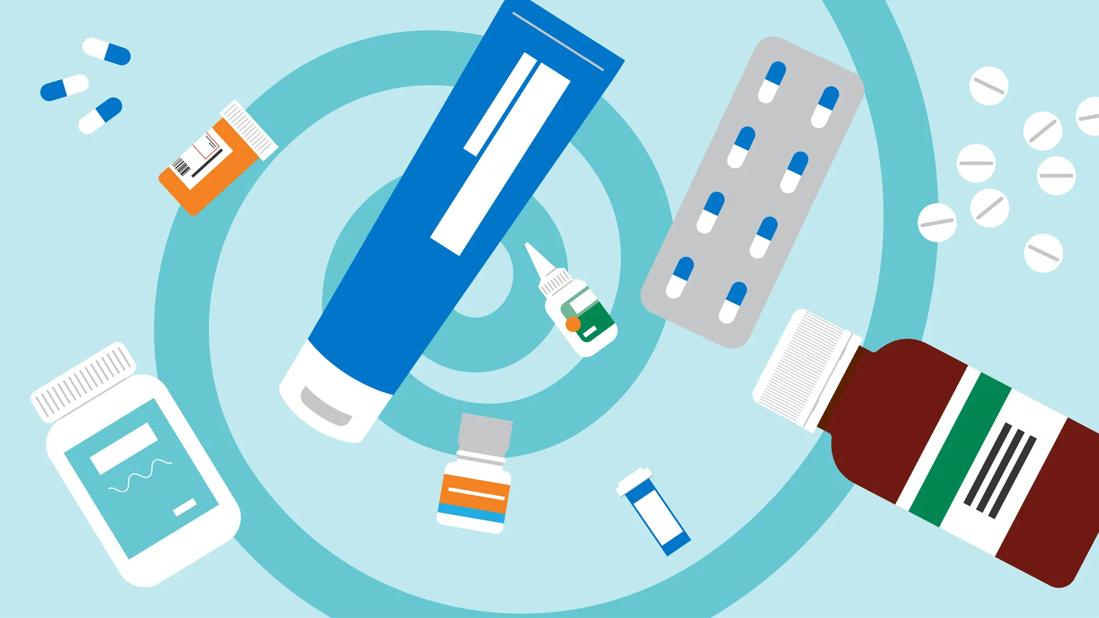Authorized take-back programs, services and drop-off locations are the best, safest way to get rid of expired medicine

Look in your medicine cabinet. Do you see bottles, pills, patches, creams or inhalers that have expired or that you no longer need? If so, it’s time to get rid of them. Pharmacist Lauren Wolfe, PharmD, explains how to do it safely.
Advertisement
Cleveland Clinic is a non-profit academic medical center. Advertising on our site helps support our mission. We do not endorse non-Cleveland Clinic products or services. Policy
All prescriptions — whether they’re in the original manufacturer’s bottle or a pharmacy container — will have a printed expiration date somewhere on the packaging. The challenge lies in knowing where to look and what to look for.
Here are some examples:
Unless it says something more specific, your medication will expire on the last day of the month listed on the package.
But Dr. Wolfe notes that if you don’t store your medication exactly as the manufacturer recommends, it could expire sooner. Temperature is a good example: Storing your medication somewhere that’s too hot or too cold can damage the product. Always ask your pharmacist about storage if you’re unsure.
Given how expensive some medications are, you might be wondering: Do I have to throw out expired medicine? Dr. Wolfe says the answer, unfortunately, is yes.
“The risk of taking expired medications is that they might not work as well, which could be unsafe,” she explains. “Some medications undergo a degradation process and become toxic, while others can be contaminated due to the breakdown of preservatives. Still others simply lose their potency and no longer work.”
Advertisement
OK. Expired and unused medications have to go. But how? Let’s get into it.
The best and safest way to get rid of unneeded or expired medication is to use an authorized take-back service.
Take-back events are available in many countries around the world. The best-known event is in the United States. The U.S. Drug Enforcement Agency (DEA) sponsors two National Prescription Drug Take Back Days each year. The first occurs in April and the second is in October. During these events, you can dispose of any kind of medication, including narcotics.
If you’d rather not wait, that’s OK, too. There are lots of other take-back programs and services out there — both in and beyond the U.S.
Drug take-back programs and services are more available now than ever before. While not all countries have structured programs, chances are good that there are services or locations in your area that will accept expired medications.
“Many police stations and outpatient pharmacies have disposal kiosks,” says Dr. Wolfe. “Some pharmacies have mail-back programs, too, which may or may not be free of charge.”
Check with your local law enforcement officials to find an authorized collector in your area. Or check the DEA’s searchable database.
The bins at drop-off locations are closed and secure to maintain privacy. But Dr. Wolfe still recommends removing personal information from your medications.
If you can’t use an in-person or mail take-back service, go online and check to see if your medication needs to be flushed down the toilet.
The U.S. Food and Drug Administration (FDA) recommends flushing certain drugs down the toilet for safety reasons. These include, but aren’t limited to, narcotic pain medicines like:
A complete list of flushable medicines is available on the FDA website.
It’s natural to worry that flushed drugs will enter rivers, lakes or drinking water. But in 2017, the FDA published a study that found the chances of contamination are low.
“The risk of someone accessing or being harmed by these medications when they’re discarded in the trash outweighs any potential harm from flushing them,” says Dr. Wolfe.
If your medications aren’t on the flush list, they’re safe to throw away. Follow these steps:
Advertisement
Some types of medication require different handling. They include:
We’ve covered a lot of territory. But you may still have questions about what to do with specific medications and medical items you no longer have use for. What about used IV bags, infusion pumps or nebulizer medication cups, for example? The answer can vary based on where you live.
Advertisement
When in doubt, Dr. Wolfe says that your best bet is to ask either your provider or pharmacist.
“If they aren’t familiar with local regulations themselves, they’ll point you to someone who is,” she reassures. By working together, we can ensure unused medicines don’t cause anyone any harm.
Advertisement
Learn more about our editorial process.
Advertisement

The little blue pill might help with physical arousal, but there are better treatments for low libido in women

Your body’s response to rapid weight loss from the medication may cause shedding

This medication is best used on a limited basis

These illegal supplements have negative impacts for vital organs and may cause psychosis, heart attacks and more

These creams that you apply to your skin can actually help reduce localized pain, swelling and inflammation

Popular among teens, these inhalants give you a quick high, with serious harmful effects

‘Black box warnings’ on medications outline potential risks and important instructions

These similar versions of brand-name drugs are safe, effective and often less expensive

The tropical fruit is a good source of antioxidants and vitamin C

Most people fall asleep within 10 to 20 minutes, but if your experience is different, adjusting your sleep schedule may help

Exploring your hidden side can lead to better understanding of what makes you tick